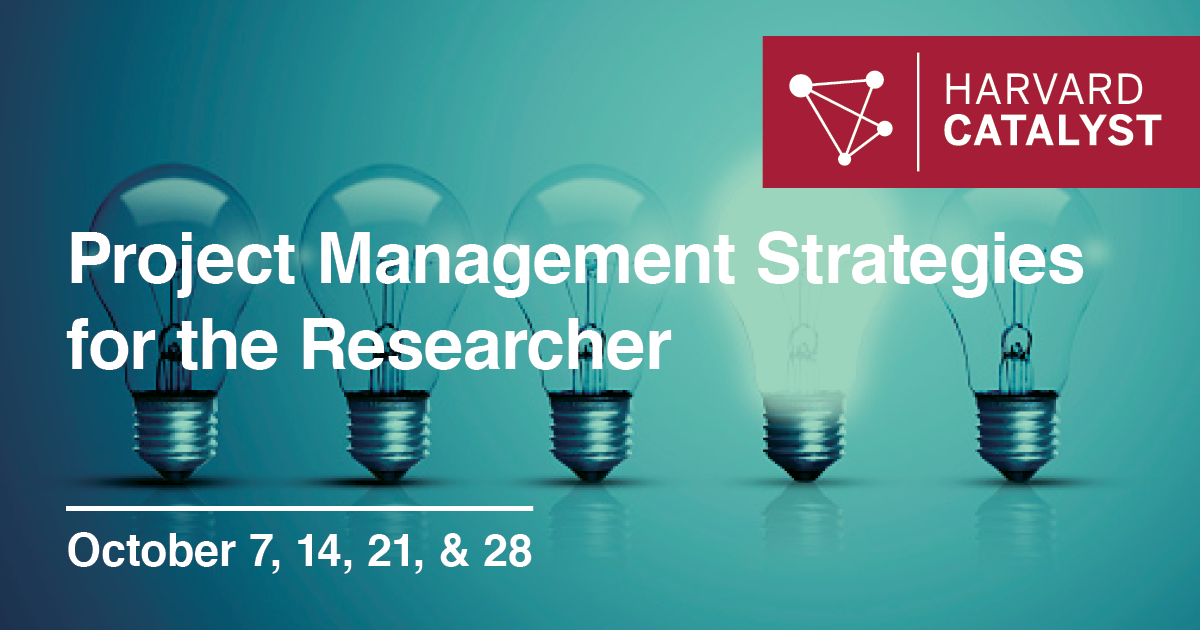News & Highlights
Topics: Education & Training
From Lab to Project
Project management skills might not seem necessary for researchers, but as it turns out, they’re critical.

This fall, scientists and researchers came together as part of Harvard Catalyst’s workshop series, Project Management Strategies for the Researcher, to learn how to apply project management principles and skills to their work and lab.
In total, 277 participants learned essential skills in planning and problem-solving over the course of four weekly meetings.
The series builds on the momentum of moving to online-only courses, which began this past spring. To meet the growing demand, Harvard Catalyst Postgraduate Education program staff quickly pivoted and worked to adapt in-person content to an online format and developed new courses for scientists, MDs, and researchers both within and outside the Harvard community.
As program staff assessed the needs within the Harvard research community, project management rose to the top of the list, said Alison O’Connor, education program developer who designed the series.
“Project management is an integral skill for everyone, especially those in the research community, whether they’re researchers or clinicians or managing a lab. Being able to provide and capture this content was a perfect way to meet our audience’s needs,” she said.
The closing session on October 28 built upon many of the essential skills covered, while providing direct guidance to participants on managing teams, delegating work, and prioritizing tasks. Panelists discussed how they use project management in their daily lives, important lessons they’ve learned, and recommendations on managing projects.
“We have a wide breadth of experience, and a lot of perspectives to share with you,” said instructor David Vincenti, PMP, senior director of program management in corporate research and development for Becton, Dickinson and Company.
“Project management is an integral skill for everyone, especially those in the research community, whether they’re researchers or clinicians or managing a lab. Being able to provide and capture this content was a perfect way to meet our audience’s needs.”
Moderated by Vincenti, panelists included Rebekka Lee, ScD, director of Harvard Catalyst’s Community Engagement program, Jonathan Thon, PhD, founder of Platelet BioGenesis and STRM.BIO, and Mark Siedner, MD, MPH, infectious disease clinician at Massachusetts General Hospital.
“I don’t think you can invest enough in relationships,” Siedner told participants, stressing the important role of each and every team member, stakeholder, and collaborator in every project.
“The entirety of my research program on HIV infection and its complications in sub-Saharan Africa is based on relationships with my foreign collaborators. Without those strong relationships, I wouldn’t be able to do the work I do.”
To create these strong relationships, communication is critical.
“It’s important to build on transparent communication,” said Lee addressing another key skill. “You need to think about the level of engagement that research partners will have in the project and be clear about what amount of time and ownership each person will have over the project.”
In addition, clear communication also helps define duties and tasks.
“Ask stakeholders what their role in the project will be,” echoed Thon. “People don’t always approach the conversation having the same idea about what the project is and what the deliverables are, so make sure those get defined clearly and transparently up front and that you’re regularly checking in throughout the project.”
Along with defining roles comes the important task of delegating work for successful project management.
Drawing from her experience as principle and co-investigator on projects, Lee emphasized, “I try to find the right size task for those on my team that ensures they have ownership, which makes them more engaged and gives them professional growth.”
Giving one last piece of advice, panelists discussed how to incorporate project management strategies into busy careers and lives.
“Reflect on your career goals and values,” said Lee. “Then, build a team that helps you reach those goals, whether that’s getting a certain number of papers out a year, getting a certain number of grants submitted, or courses developed.”
Priorities are also important to consider.
“You need to take time to map out what your goals are, build some realistic timelines, and reassess regularly,” continued Thon. “When I was in my 20s career was the most important thing, but as I entered my 30s and got married and began a family my priorities shifted. Career was still important, but it wasn’t exclusively important and I rethought my plan to include time with my family and things other than work.”
Capitalizing on the enthusiastic response to the series, the Postgraduate Education program team added two additional sessions in November and December on scheduling and risk management. Participants can expect to see more learning opportunities offered in the future. “It was great to see such positive response and feedback to this series, and we’ll be working on developing brand new content on other boundary-crossing topics,” said O’Connor.

